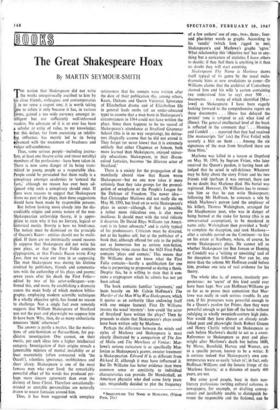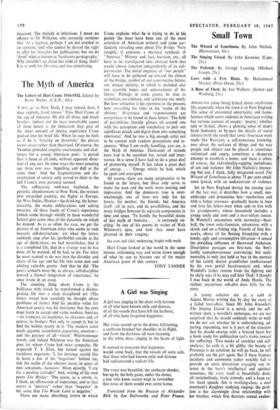The Great Shakespeare Hoax
CA5
By MARTIN SEYMOUR-SMITH
THE notion that Shakespeare did not write the works unequivocally ascribed to him by his close friends, colleagues and contemporaries c' in no sense a cogent one; it is worth taking e to refute it only because it has, in various orms, gained a too wide currency amongst in- telligent but not sufficiently well-informed readers. No advocate of it is or ever has been scholar or critic of value, to my knowledge; iut this defect, far from exercising an inhibit- ng influence, has merely led to its being vaned with the maximum of brashness and vulgar self-confidence.
Thus, some serious people—including journa- lists, at least one theatre critic and (most notably) members of the professions—have been taken in. There is now some danger of its being trans- mitted to young people as a respectable idea. people could be persuaded that there really is a conspiracy amongst academics to 'conceal the facts,' although no reason has ever been ad- ..- tanced why such a conspiracy should exist. If there were reasons to suggest that Shakespeare wrote no part of the plays, then these suggestions would have been made by responsible persons.
But before looking more closely into the dis- creditable origins and comic nature of the non- Shakespearian authorship theory, it is appro- - 'ate to state why it has no literary, logical or torical merits. Brevity is here no hindrance. The notion must be dismissed on the principle of Occam's Razor: entities should not be multi-
tplied. If there are no intrinsically sound reasons o suppose that Shakespeare did not write his own plays, or that the First Folio contains 4". gyprograms, or that Francis Bacon wrote King 4ea ptr, then we waste our time in so supposing. The man Shakespeare was during his lifetime credited by publishers, friends and commenta- tors with the authorship of his plays and poems; seven years after his death the First Folio— edited by two of his actor-colleagues—con- firmed this, and more, by establishing a dramatic canon the main body of which modern biblio- graphy, employing modern scientific techniques rb a wholly objective spirit, has found no reason to challenge. Not a single fact even remotely suggests that William Shakespeare of Stratford was not the poet and playwright we suppose him to have been. Why, then, do so many enthusiastic amateurs 'think' otherwise?
The answer is partly a matter, like the motiva- tions of anti-Semitism or flat-earthism, for psy- chiatric investigation. One cannot, on their merits, put such ideas into a higher intellectual category. Investigation of their origins reveals a lamentable mixture of mental instability or at least eccentricity (often connected with 'the Occult'), relentless ignorance, snobbishness and sheer idiocy. Shakespeare is one of the most famous men who ever lived; the remarkably powerful effect of his words has produced per- haps more sincere agreement than even the divinity of Jesus Christ. Therefore sensationally- minded or unstable personalities are naturally drawn to weave fantasies around him.
Thus, it has been suggested with complete seriousness that his sonnets were written after the date of their publication (by, among others, Keats, Dickens and Queen Victoria). Ignorance of Elizabethan drama and of Elizabethan life in general leads snobs (of an under-educated type) to assume that a man born in Shakespeare's circumstances in 1564 could not have written the plays. Since there happens to be no record of Shakespeare's attendance at Stratford Grammar School (this is in no way surprising), his detrac- tors illogically assume that he did not attend it. They forget (or never knew) that it is extremely unlikely that either Chapman or Jonson, both more learned than Shakespeare, enjoyed univer- sity educations. Shakespeare, in their ill-con- ceived fantasies, becomes 'the illiterate actor of Stratford.'
There is a society for the propagation of the manifestly absurd view that Bacon wrote Shakespeare—but no one now takes it more seriously than they take groups for the promul- gation of ectoplasm or the People's League for the Defence of Freedom. The newer idea— that Christopher Marlowe did not really die on May 30, 1593, but lived on to write Shakespeare's plays in secret—although, if that is possible, a rather more ridiculous one, is also more insidious. It should meet with the total ridicule it deserves. Dr David Rhys Williams (an Ameri- can) is its latest advocate,* and is richly typical of his predecessors. Criticism must be directed, not at his hapless self, but at the publisher of a book that, although offered for sale to the public not as humorous but as serious non-fiction, nevertheless twice states that the 1623 First Folio contains 'plays and sonnets.' This means that Dr Williams does not know what the First Folio contains—hardly a qualification for one who is purporting to propound so daring a thesis. Despite this, he is willing to state that it con- tains a cryptogram which he admits has not yet been solved.
The book contains familiar 'arguments,' and leans heavily on Mr Calvin Hoffman's The Murder of the Man Who Was Shakespeare, which it quotes as an authority (thus endowing itself with one unique feature). First Dr Williams invents the usual 'mystery': how could 'the actor of Stratford' have written the plays? Then he proceeds to claim that Shakespeare's plays could have been written only by Marlowe.
Perhaps the difference between the minds and styles of Marlowe and Shakespeare is most clearly illustrated by a comparison of The Jew of Malta and The Merchant of Venice: Mar- lowe's serious caricature is as specifically Mak- lovian as Shakespeare's graver, sweeter treatment is Shakespearian. Edward 11 is as different from Richard II, although it may have influenced it. But Dr Williams has better evidence than 'mere common sense or sensitivity to individual characteristics can provide. Dr Mendenhall, an American physicist who died some forty years ago, misguidedly decided to plot the frequency * SHAKESPEARE THY NAME IS M kRLOWE. (Vision Press, 21s.) of a few authors' use of one-, two-, three-, four- and plus-letter words as graphs. According to his 'results' (which look rigged to me), Shakespeare's and Marlowe's graphs 'agree.' What relationship this 'objective test' has to any- thing but a- caricature of statistics I leave others to decide: if they feel there is anything in it then no doubt they will start counting.
Shakespeare Thy Name is Marlowe shows itself typical of its genre by the usual melo- dramatic hints at new revelations to come—Dr Williams claims that the archivist of Canterbury showed him and his wife 'a carton containing (we understood him to say) over 500 . . . documents . . . many of which identified [Mar- lowe] as Shakespeare. I have been eagerly looking forward to the comprehensive report on these documents . . . illness has delayed the project' (one is tempted to ask what kind of illness). The general intellectual level of the book is reflected in the comment that . . Heming and Condell . . . reported that they had received [the manuscripts 'for' (sic) the First Folio] with scarcely a blot on them . . . Among the six signatures of the man from Stratford there are three blots.'
Marlowe was killed in a tavern at Deptford on May 30, 1593, by Ingram Frizer, who later received the Queen's pardon, it having been ad- judged that he acted in self-defence. Whatever may be fishy about the story Frizer and his two friends told (perhaps it was untrue), there can be no doubt that Marlowe died. His burial was registered. However, Dr Williams has to resusci- tate him so that he can write Shakespeare; following Mr Hoffman, he concocts a tale by which Marlowe's patron (and the employer of his killer), Thomas Walsingham, arranged for the blasphemous poet, who was in danger of being burned at the stake for heresy (this is an unwarranted assumption), to be murdered in name only; Walsingham then provided a 'body' to complete the deception, and took Marlowe— after a suitable period on the Continent—to live on his estate at Scadbury, where, of course, he wrote Shakespeare's plays. He cannot tell us whether Shakespeare (or Ben Jonson or Heming or Condell) was a 'witting or unwitting' tool of the deception that followed. Nor can he, any more than the solemn Mr Hoffman could before him, produce one iota of real evidence for his theory.
The whole idea is, of course, insolently pre- posterous: no 'secret' of this kind could ever have been kept. Nor can Hoffman/Williams go so far as to prove their contention that Mar- lowe was really in such serious trouble. In any case, if his protectors were powerful enough to fix a Queen's pardon for Frizer, then they were powerful enough to get him off the hook without indulging in wholly twentieth-century high jinks. Nor would they have chosen an already estab- lished poet and playwright (both Robert Greene and Henry Chettle referred to Shakespeare as such before Marlowe's death) to act as a cover. References to Shakespeare as poet and play- wright after Marlowe's death but before 1600, by Meres, Barnfield, Harvey and Weever, are to a specific person, known to be a writer. It is curious indeed that Shakespeare's own con- temporaries were so easily 'taken in'; in fact, only Hoffman/Williams and the lunatic fringe of the 'Marlowe Society,' at a distance of- nearly 400 years, are not.
But some good people, busy in their non- literary professions (writing cultural columns in newspapers, for example, or drafting convey- ances) and justifiably unable to distinguish be- tween the responsible and the fictional, can be deceived. The malady is infectious. I mean no offence to Dr Williams, who correctly surmises that 'As a layman, perhaps I am not. entitled to an opinion,' and who cannot be denied the right to offer his thoughts for publication; but we do 'shred' what is known as 'hard-core pornography.' Why shouldn't we shred this kind of thing, then? It is as unfit for libraries, and less stimulating.



































 Previous page
Previous page